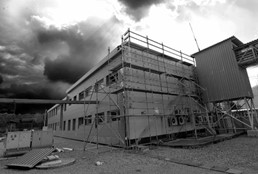Insulating A Commercial Building: Why It Matters & How to Get It Right

When it comes to running a successful business, energy efficiency and comfort aren't just nice-to-haves—they're essential. Whether you're managing an office space, a retail store, or an industrial facility, properly insulating your commercial building can make a significant difference in both operational costs and the overall environment.
The Importance of Insulation in Commercial Buildings
- Energy Efficiency and Cost Savings One of the most compelling reasons to insulate your commercial building is the potential for energy savings. A well-insulated building maintains a consistent temperature, reducing the need for excessive heating in the winter and cooling in the summer. This not only cuts down on your energy bills but also decreases the strain on your HVAC systems, potentially extending their lifespan.
- Enhanced Comfort Whether it's your employees or your customers, comfort is key to productivity and satisfaction. Poor insulation can lead to drafts, uneven temperatures, and an uncomfortable work environment. By investing in quality insulation, you create a more pleasant space, which can improve employee morale and enhance customer experiences.
- Soundproofing Insulation doesn't just help with temperature control—it also acts as a barrier to noise. In busy commercial settings, reducing noise pollution can be crucial. Insulation can help minimize distractions, creating a quieter, more focused environment, which is especially important in office buildings or spaces where concentration is key.
- Environmental Responsibility As businesses increasingly focus on sustainability, energy-efficient buildings are becoming a standard. Proper insulation reduces the energy your building consumes, which in turn lowers your carbon footprint. By investing in insulation, you're not just saving money; you're also contributing to a more sustainable future.
Key Areas to Insulate in Your Commercial Building
- Roof and Attic Heat rises, making the roof and attic prime areas for heat loss. Insulating these spaces is critical to maintaining a stable temperature throughout the building. Consider options like spray foam or blown-in insulation, which can effectively seal gaps and provide comprehensive coverage.
- Walls Exterior walls are another significant source of energy loss. Depending on the type of building and the climate, you may need to choose between rigid foam insulation, spray foam, or fiberglass batts. Each option has its pros and cons, so it’s important to select the right material for your specific needs.
- Floors and Basements If your building has a basement or is built on a slab, floor insulation is crucial. This is especially important if the space is used for storage, office space, or any other purpose where temperature control is necessary. Insulating the floor can help prevent cold air from seeping in and keep the area comfortable.
- Windows and Doors Windows and doors are common culprits for drafts and heat loss. While insulation itself doesn’t apply directly to windows and doors, ensuring they are properly sealed and choosing energy-efficient models can significantly impact overall insulation effectiveness. Weatherstripping and caulking are also essential to prevent air leaks.
Professional Insulation Installation: Why It’s Worth It
While there are DIY options for insulating your commercial building, hiring professionals like Koala Insulation of Baltimore ensures that the job is done right the first time. Professional installers have the expertise to assess your building’s specific needs, recommend the best materials, and ensure proper installation to maximize energy efficiency and comfort.
Conclusion
Insulating your commercial building is an investment that pays off in numerous ways—from lowering energy bills to creating a more comfortable environment for employees and customers. By focusing on key areas like the roof, walls, floors, and windows, and by trusting professionals for installation, you can ensure your building is energy-efficient, comfortable, and environmentally responsible. Contact Koala Insulation of Baltimore today to learn more about how we can help you achieve these goals with top-notch insulation services.
Find Your Location


Get a quote


